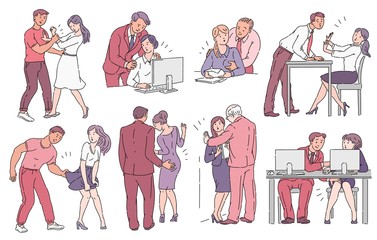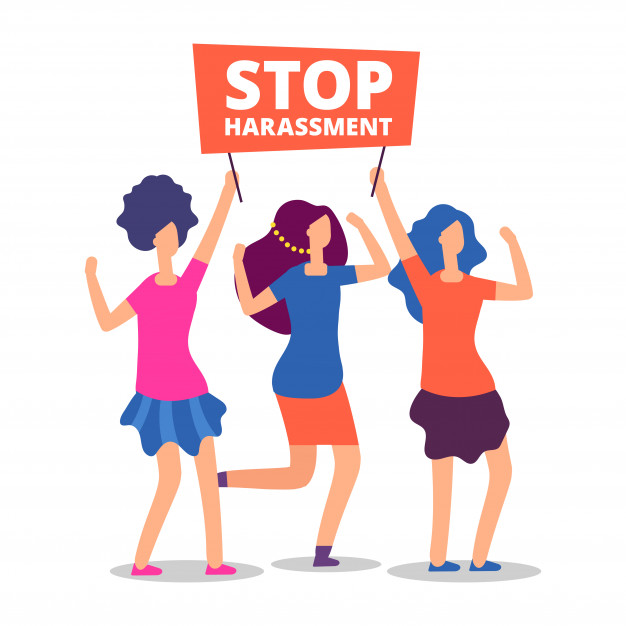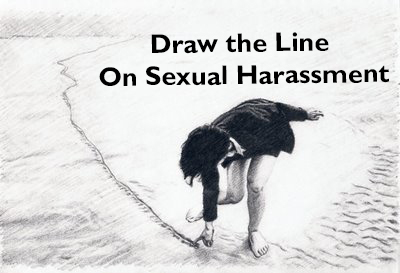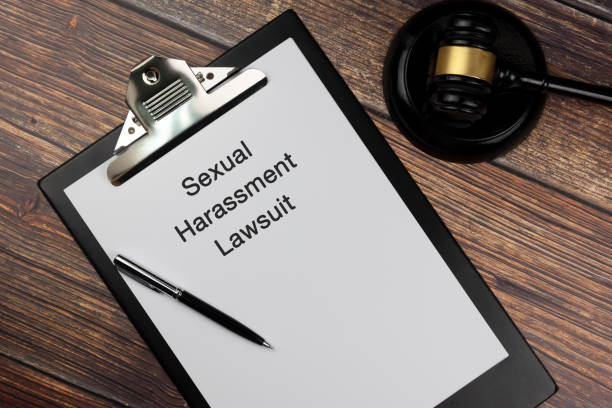
Sexual Harassment differences? You may be suffering from sexual assault or harassment. It’s confusing, and not very well understood, so we are going to try and clarify the meaning of the different terms.
Harassment
Harassment in the workplace can take many forms but more often than not, it creates a toxic environment for employees and a headache for employers. Harassment is conduct that is usually ongoing torment and can be used to describe abuse, insults, or otherwise harming another individual on a regular basis.
Harassment is a broad umbrella term used to describe a variety of tormenting behaviour, such as physical harassment, emotional harassment and harassment of a sexual nature.
Physical harassment refers to physical abuse such as sexual assault or violence on the body while emotional abuse refers to imposing stress and bullying. These forms of harassment overlap with bullying, sexual harassment and discrimination.
Emotional harassment can be defined as hostile verbal and nonverbal behaviours that are not explicitly tied to sexual or discriminatory tendencies, yet they are directed at manipulating and degrading an employee. The most common form of emotional harassment in the workplace is bullying.

The difference between sexual assault and sexual harassment
The difference between sexual assault and sexual harassment is that sexual assault involves touching without valid consent, while sexual harassment is a general term that includes any inappropriate sexual touching and/or comments. Sexual assault is a term that is used in the criminal and civil context, while sexual harassment is used for labour and employment law related matters.
Being the victim of sexual harassment does not necessarily make you the victim of a sexual assault (though you could be). If you are sexually harassed at work, you have not necessarily been the victim of a sexual assault. Even if the actions do not constitute a sexual assault, the employer may still be punished for sexual harassment regardless of whether the sexual harassment meets the definition of sexual assault.
‘Sexual assault’ is often called other names like sexual abuse, rape, indecent behaviour, indecent assault, sexual molestation, incest, child sexual abuse, child sexual assault, touching, ‘feeling up’ and sexual harassment.
Sexual harassment constitutes sex discrimination (Birch v Wesco Electrics (1966) Pty Ltd (2012) 218 IR 67 [81]; Aldridge v Booth (1988) ALR 1 [16]-[17]), as the employee has been treated less favourably than colleagues of the opposite sex in being sexually harassed.
Examples your employer does not want you to know
Harassment in the context of sexual harassment and sex discrimination can include behaviour such as:
- sending explicit or sexually suggestive emails or text messages
- displaying pornographic posters or screen savers
- asking intrusive questions about someone’s personal life, including his or her sex life.
- unwelcome touching, hugging or kissing;
- staring or leering;
- sexually suggestive comments or jokes;
- unwanted invitations to go out on dates or requests for sex;
- behaviour which would also be an offence under the criminal law, such as physical assault, indecent exposure, sexual assault, stalking or obscene communications.
A one-off incident can constitute harassment. Sexual harassment is not sexual interaction, flirtation, attraction or friendship which is invited, mutual, consensual or reciprocated. However, if this consent is withdrawn or no longer invited and mutual, such as one employee wanted the relationship to end and the other party does not agree, this may constitute sexual harassment.

Employer’s Obligations
All incidents of harassment and assault require employers or managers to respond quickly and appropriately. Federal and state legislation protect employees from harassment in the workplace under anti-discrimination laws, workplace health and safety laws and state crimes acts.
These laws dictate that employers may be vicariously liable for harassment on behalf of their employees, unless they have taken all reasonable steps to prevent the harassment taking place. When dealing with harassment at work in a general sense, prevention is better than cure.
In order to prevent harassment, an employer should have an appropriate policy, implement it and monitor its effectiveness. This may include conducting training, modules or seminars on sexual harassment in order to educate employees on the policies and procedures.
Engaging with employees on the issue and raising awareness of the company’s zero-tolerance policy for unacceptable behaviour are key to avoiding incidences of sexual harassment occurring in the first place. People cannot make their best contribution if they are working in fear of harassment or bullying.
These policies and procedures should be reviewed on a regular basis to ensure they are compliant with the requirements under state and federal law. Alongside policies, employers should promote the importance of respect between employees at every level of the organisation, encouraging a supportive and inclusive culture so that people’s behaviour reflects the right values.

Bullying a workplace culture
A company’s human resources team also have a crucial role to play in helping to build a workplace culture that is inclusive and free of harassment. The HR team have a responsibility to ensure that any poor practices and behaviours that have led in the past to grievances and complaints do not continue.
Organisations should also strive to develop a culture in which harassment is known to be unacceptable and where individuals are confident enough to bring complaints without fear of adverse action. Organisations should deal promptly, seriously and confidentially with any issues that are raised, whilst displaying full support for the individual coming forward.
The first step to achieving this is to put in place a robust policy that clearly articulates the organisation’s commitment to promoting dignity and respect at work.
Communicating the details of this policy is crucial, so that all individuals know their rights, what steps to take if they want to make a complaint, but also that they have a responsibility to behave in ways which support a non-hostile working environment for themselves and their colleagues.
These standards need to be reiterated and updated on a regular basis to build an inclusive culture that doesn’t tolerate any form of discrimination or harassment. Employees should be encouraged to play their part in making the organization’s policy a reality and be prepared to challenge inappropriate behaviour and take action if they observe or have evidence that someone is being harassed.

What if my employer doesn’t address the harassment?
If you have lodged a grievance with the company and they failed to act on it or did act on it, but you are unhappy with the outcome, there are several complaints you can make externally. Whilst it is important for companies to have rigorous policies in place, they do not always work, and their outcomes are not always promising.
The most effective method of dealing with any form of harassment in the workplace, is lodging a claim to the Fair Work Commission.
If an employee is still employed by an employer and wishes to make an application in regard to workplace bullying, physical harassment, emotional harassment or sexual harassment, the employee can lodge a Form F72 – Application for an order to stop bullying and/or sexual harassment.
The stop sexual harassment order application seeks a preventative remedy, not remedial, punitive or compensatory. If appropriate, the Fair Work Commission will schedule a mediation session for the parties involved to try to help them resolve the case.
Bind your employer to their obligations!
A binding decision or order will require a worker/s or the employer to stop the bullying behaviour. The worker/s may be ordered to comply with the employer policies, to be separated, transferred, have rosters changed, for the employer or principal to monitor the behaviour or their work participants, for training or counselling to be offered to the worker and to be taken up by the worker.
The employer may be ordered to review and improve their bullying policies and complaint handling policies or for behaviour to cease outside of work.
In instances where an employee is victim of sexual assault and is in fear or immediate danger, it is best the employee contact the police and look into lodging a report for potential criminal charges to be laid.
However, bear in mind that criminal laws do not provide you with any sort of remedy or compensation for the assault. Criminal sexual assault will punish the accused in accordance with the law, but you may still be able to lodge a claim against the company under vicarious liability.

Conclusion: Sexual Harassment differences? Sexual assault or just Harassment
Sexual Harassment differences? Sexual assault or just Harassment. I hope this article has assisted you, the article also makes it clear that you have rights, it’s how you excise those rights. I would say 70% of employees who ring us or send us an email, lack empowerment, lack confidence, feel appressed.
I’ve seen this years ago on the indigenous community, a sense of helplessness to change things, to get out of the setting. Well, I’m here to do this for you, I will not fail you. Yes, “words are cheap” as they say, “action speak louder than words”, I know that, but start the wheel of change. Whether you seek a stop sexual harassment order or compensation speak to us.
We are not sexual harassment lawyers, or harassment lawyers, but the nation’s leading workplace advisors, we have 30 years’ experience. We have been representing people in sexual harassment and discrimination cases since 2004, not since it’s become fashionable with the MeToo movement.
We are leaders in workplace and social commentary, want to contribute to the discussion, give us a call. You have any questions, concerns, want to pursue a claim, even those that appear to be historical, your welcome to call us on 1800 333 666 or email mediate@awna.com.au.
Fair work Commission, stop sexual harassment order, forced to resign due to sexual harassment. Find out “what is my case worth“, compare your case and circumstances.
We assist employees with anything to do with the workplace, all Fair work Commission matters, including unfair dismissals, workplace investigations, forced to resign, stop sexual harassment order, call us at any time.













